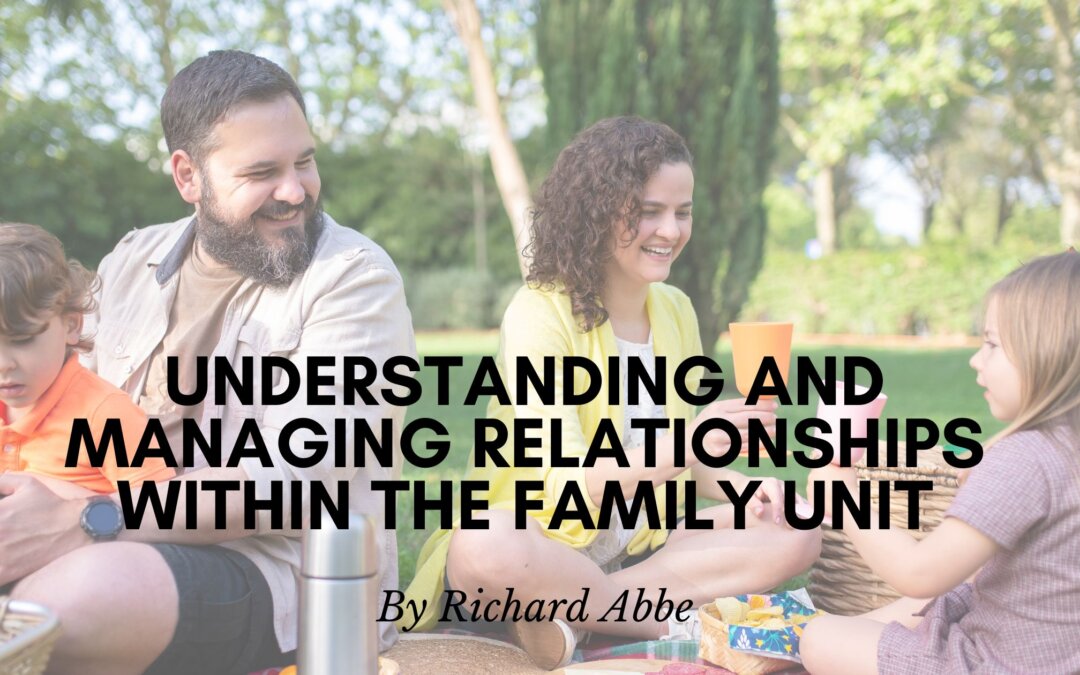The family unit is the cornerstone of society; within it, we form some of our most profound and enduring relationships. Our families provide us with a sense of belonging, support, and love but can also be sources of conflict and tension. Understanding and managing relationships within the family unit is crucial for fostering healthy dynamics and maintaining strong bonds.
The Dynamics of Family Relationships
Family relationships are multifaceted, shaped by a combination of factors, including genetics, upbringing, shared experiences, and personal growth. Here are some key aspects of family dynamics:
- Roles and Expectations: In most families, individuals assume specific roles and responsibilities. Cultural norms, gender expectations, and family traditions can influence these roles. Understanding these roles and expectations is vital for managing family dynamics.
- Communication: Effective communication is the bedrock of healthy family relationships. Clear and open communication promotes understanding and helps resolve conflicts. Miscommunication or lack of communication can lead to misunderstandings and tension.
- Boundaries: Establishing and respecting boundaries is essential within the family unit. Boundaries define personal space, privacy, and individual autonomy. Healthy boundaries promote respect and prevent issues like intrusion and codependency.
- Conflict Resolution: Conflict is natural in any relationship, including within families. The key is how conflicts are managed. Healthy families develop constructive ways to address and resolve conflicts, fostering growth and understanding.
- Support Systems: Family provides a support system during challenging times. This support can be emotional, financial, or practical. Understanding the support system within the family unit is crucial for maintaining a sense of security.
- Changes and Transitions: Families evolve over time. Changes like marriage, childbirth, divorce, and aging can significantly impact family dynamics. Adapting to these changes and managing transitions is essential for maintaining harmony.
Managing Family Relationships Effectively
Effective management of family relationships requires effort, empathy, and open communication. Here are some strategies for nurturing healthy family dynamics:
- Communication: Open and honest communication is the foundation of strong family relationships. Encourage family members to express their thoughts, feelings, and concerns. Listening actively and without judgment is equally essential.
- Active Listening: Practice active listening by giving your full attention to the speaker. This means not interrupting, asking clarifying questions, and acknowledging their feelings.
- Conflict Resolution: Teach conflict resolution skills within the family. Emphasize the importance of addressing conflicts respectfully and constructively. Avoid blame and instead focus on finding solutions that benefit everyone.
- Quality Time: Spend quality time together as a family. Create opportunities for shared experiences, such as family meals, outings, or game nights. These moments strengthen bonds and create lasting memories.
- Boundaries: Discuss and establish healthy boundaries within the family. Respect each other’s personal space and autonomy. Clear boundaries help prevent conflicts and misunderstandings.
- Empathy: Practice empathy by understanding each family member’s perspective, even if you disagree. Empathy fosters compassion and strengthens emotional connections.
- Flexibility: Be flexible and adaptable in response to changing family dynamics. Recognize that individuals grow and change over time; family roles may need adjustment.
- Seek Professional Help: In cases of persistent conflict, complex issues, or strained relationships, seeking the assistance of a family therapist or counselor can be beneficial. These professionals provide tools and strategies for resolving deeper conflicts.
Roles and Expectations in the Family Unit
Family roles and expectations can significantly influence relationships within the family unit. It’s essential to recognize these roles and understand their impact:
- Parental Roles: Parents typically assume the roles of caregivers, providers, and role models. They are responsible for nurturing, educating, and guiding their children. It’s crucial for parents to strike a balance between authority and support.
- Sibling Relationships: Sibling relationships can be both loving and challenging. Siblings often share unique bonds shaped by shared childhood experiences. Encourage siblings to support and communicate with each other.
- Extended Family: Extended family members, such as grandparents, aunts, and uncles, can play significant roles in a family. These relationships provide additional sources of love, guidance, and support.
- Changing Roles: As children grow into adults, their roles within the family may shift. They may take on caregiving responsibilities for aging parents or contribute to the family’s financial well-being.
Cultural and Generational Considerations
Cultural and generational factors can also influence family dynamics. It’s important to be aware of these factors and their impact on relationships:
- Cultural Diversity: Families from different cultural backgrounds may have unique traditions, values, and communication styles. Embrace cultural diversity within the family and learn from each other’s traditions.
- Generational Differences: Differences in values, technology use, and lifestyle can sometimes lead to misunderstandings. Bridge these gaps through open dialogue and a willingness to learn from one another.
- Respect Traditions: Honor and respect family traditions, as they often hold deep cultural or sentimental significance. At the same time, be open to adapting traditions to accommodate changing circumstances.
- Intergenerational Communication: Encourage intergenerational communication by creating spaces where family members of different ages can share their experiences, perspectives, and wisdom.
Conclusion
Family relationships are a rich tapestry of love, support, and connection, but they also come with challenges that require understanding and management. Recognizing the importance of family roles and cultural influences while also seeking professional help when needed can further enhance the overall well-being and harmony within the family unit. Ultimately, the strength of family relationships lies in the commitment to mutual understanding, respect, and unconditional love.

